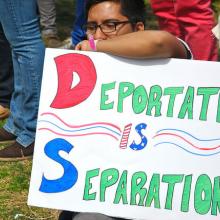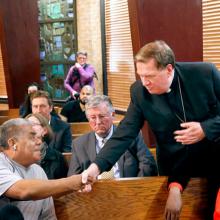immigration reform

Demonstrators at the White House protest President Donald Trump's decision to phase out DACA, Sept. 9, 2017. Photo by bakdc / Shutterstock
This year is the best chance we have had in nearly a decade to change our broken immigration system.
On Sunday, President-elect Joe Biden announced that he will unveil an immigration bill — which includes an eight-year path to citizenship for an estimated 11 million undocumented immigrants in the U.S. — on Day One of his administration. The proposed bill includes an option for undocumented agricultural workers, people under temporary protective status, and immigrants who arrived in the U.S. illegally as children to qualify more immediately for green cards if they are working, are in school, or meet other requirements.
IN MAY, the Trump administration ended Temporary Protected Status for Hondurans, opening the door for the deportation of nearly 60,000 legal immigrants to the U.S. and threatening the security of their American-born children. The Department of Homeland Security is systematically stripping TPS status from more than 300,000 people, including immigrants from El Salvador (195,000), Haiti (50,000), Nepal, Nicaragua, and Sudan. Decisions on Yemen and Somalia are expected in July.
Temporary Protected Status enables foreign nationals to live and work in the United States while conditions exist in their home countries that prevent safe return, such as armed conflict, natural disaster, or other extreme circumstances. Hondurans were granted TPS following Hurricane Mitch in 1998. Honduras holds the second-highest rate of nationals murdered after their deportation, according to the Immigrant Legal Resource Center.
The “crucified people” from Central America are “not so much pursuing the American dream as they are fleeing the Central American nightmare,” said Jesuit priest Dean Brackley, who spent more than 20 years teaching in San Salvador, in 2011.

sakhorn / shutterstock
BETWEEN 1980 and 2013, the federal prison population increased by 800 percent, according to the Department of Justice, at a far-faster rate than the Bureau of Prisons could handle. By 2013, approximately 15 percent of BOP’s prisoners were housed in for-profit prisons.
In August, the Department of Justice (DOJ) announced that it will no longer contract with private prisons for housing federal prisoners. “[Private prisons] simply do not provide the same level of correctional service, programs, and resources,” said Deputy Attorney General Sally Yates. “They do not save substantially on costs; and as noted in a recent report by the Department’s Office of Inspector General, they do not maintain the same level of safety and security.”
Within weeks, Secretary of Homeland Security Jeh Johnson responded to DOJ by directing his teams “to evaluate whether the immigration detention operations conducted by Immigration and Customs Enforcement [ICE] should move in the same direction” — to evaluate whether ICE should eliminate contracts with for-profit immigration detention companies. There is no need for a review. Multiple reports, from human rights organizations and the Department of Justice itself, give damning evidence against the inhumane practices of for-profit prisons and detention centers.
As the leader of a Christian denomination, I feel a deep obligation to pay attention to foundational passages from our sacred texts in the midst of the current challenges we face as a country. When it comes to prisoners and immigrants, two passages are bedrock for me. Leviticus 19:34 reminds us to love foreigners as we love ourselves. In Matthew 25:31-46, Jesus prioritizes the vulnerable. He issues a clear call for those who follow him to care for the stranger, the prisoner, the naked, the hungry, and the thirsty.
Earlier this week, I participated in civil disobedience for the first time. Forty Catholic sisters, priests, and other lay Catholic advocates were arrested in the rotunda of the Russell Senate Office Building in solidarity with young undocumented “Dreamers.” These immigrants, brought to this country as children, are living in fear of deportation after the Trump administration ended an Obama-era program that offered them protection. Congress now has to find a solution. About a third of all House members, including Speaker Paul Ryan, and a quarter of senators are Catholic. More than a 100 Catholics, including Dreamers, showed up for a rally and press conference outside the Senate building, urging lawmakers to act.
Today, Lopez-Marquez is at Presbyterian Medical Services, Santa Fe Family Wellness Center, where he’s the only male social worker on staff who’s also bilingual. He is also an after-school folklorico dance instructor for Aspen Santa Fe Ballet. Between counseling and dance, Lopez-Marquez works with 180 youth in New Mexico; his work permit through DACA makes all that possible.
WHAT DOES "SANCTUARY" mean today? The church I attend in Hyattsville, Md., a close-in suburb of Washington, D.C., took up this question after the 2016 presidential election.
Hyattsville Mennonite Church had been a “sanctuary church” in the 1980s. Given the current increase in the legitimate fear of deportation in the migrant community, we considered renewing our commitment to offering sanctuary.
In the 1980s, sanctuary was offered in the context of people fleeing the violence and devastation of the wars in Central America. In those days, offering sanctuary meant offering physical protection to individuals by housing them in churches—but it was also a broadly political statement of opposition to the U.S. government support for the wars in Nicaragua, Guatemala, and El Salvador.
Today the situation is different. The last comprehensive reform of U.S. immigration laws took place 30 years ago. Since then millions of undocumented people have established lives in the U.S. They’ve had families and raised their children here. But immigration laws have not kept pace, and paths to regularize their immigration status have been increasingly blocked. For most, there simply is no path.
“Now think about it, especially right now, with apparent one-party rule in our government: Congress and the president could pass comprehensive immigration reform tomorrow if they wanted to,” Cardinal Joseph Tobin of Newark told an audience of journalists meeting in Brooklyn on May 17. “They could bring nearly 12 million people out of the shadows — if they wanted to."

Image via ndlon/flickr.com
A recent study by the Public Religion Research Institute reveals there aren’t any states in the U.S. in which 50 percent or more of its residents support deportation as adequate reform of the immigration system. Even in California, Texas, and Florida, states that respectively have the highest, second-highest, and third-highest number of undocumented immigrants in the country, this holds true.
For much of its long history in the U.S., the Catholic Church was known as the champion of the working class, a community of immigrants whose leaders were steadfast in support of organized labor and economic justice – a faith-based agenda that helped provide a path to success for its largely working-class flock.
In recent decades, as those ethnic European Catholics assimilated and grew wealthier, and as the concerns of the American hierarchy shifted to battles over moral issues, such as abortion and gay marriage, traditional pocketbook issues took a back seat.
Sessions has long been, in the words of one prominent immigration advocate, the “most anti-immigrant senator in the chamber.” When George W. Bush, a self-styled “compassionate conservative” and born-again Christian, pushed a comprehensive immigration reform bill in 2007 that was supported by many business and law-enforcement officials, Sessions railed against what he called the “no illegal alien left behind bill” and led the charge against the failed effort. “Good fences make good neighbors,” he said at a press conference the year before.
As voters debate which political candidate is most qualified to be the future leader of our nation, more than 170 faith and community leaders from across the country will conclude an 11-day walking pilgrimage to urge lawmakers in California and throughout the nation to fix our country’s broken immigration system.
This journey for justice, which began at the Tijuana border and will conclude at a Los Angeles detention center, is not merely an exercise in civil disobedience for the disaffected. We are not jaded, nor have we lost hope. We are walking because we understand that our feet can fuel progress, our voices can reunite families, and our sweat can change history.

Image via REUTERS/David Ryder/RNS
The 2016 Republican presidential campaign boils with anti-immigrant rhetoric but candidates’ harsh proposals don’t resonate with most Americans, particularly religious believers and young adults.
A new analysis by the Public Religion Research Institute, released March 29 finds that many reject harsh proposals such as building a wall along the U.S.-Mexico border and deporting millions of undocumented immigrants, said Dan Cox, director of research for PRRI.
The Supreme Court’s decision to take up the case now is highly significant, since it means that the court will rule on the matter during this term (likely by the end of June), allowing President Obama and his administration to at least begin moving forward with implementation before he leaves office.

izzet ugutmen / Shutterstock
IN NOVEMBER, the Fifth Circuit Court of Appeals blocked a series of Obama administration executive orders intended to shield millions of immigrants from deportation.
Of course, there’s a backstory: After the 2014 failure of Congress to pass comprehensive immigration reform, President Obama attempted to create one program, called Deferred Action for Parents of Americans and Lawful Permanent Residents (DAPA), and expand an existing one, called Deferred Action for Childhood Arrivals (DACA).
As its name suggests, DACA was created to protect children—more than 1.7 million, according to the Migration Policy Institute—who were brought to the United States before they turned 16. These “Dreamers” have become a visible and powerful political movement. DAPA is intended to provide work permits and exemption from deportation to those adults with children who are U.S. citizens or lawful permanent residents.
In the dangerous environment created by our failed immigration policy, these two protections are essential for keeping families safe and together.
But when the Obama administration announced these programs in November 2014, some states claimed that expanding the number of immigrants allowed to stay in the U.S. would cause an unfair increase in the cost of state services. Ultimately, 26 states sued to stop the DAPA/DACA changes. In November 2015, the Fifth Circuit—which covers Louisiana, Mississippi, and Texas—found in favor of the states. The Justice Department then appealed the decision to the U.S. Supreme Court, which is likely to decide the case before a new president takes office.
Immigrant and family advocates, along with religious leaders, criticized the ruling. “After the Fifth Circuit’s decision concerning DACA and DAPA, what remains abundantly clear is that the U.S. Congress needs to urgently address immigration reform,” said Gabriel Salguero, president of the National Latino Evangelical Coalition. “Hispanic Evangelicals are looking for genuine leadership on this issue. No more delays and excuses.”
Nineteen faith-based organizations (including Sojourners) filed an amicus brief with the Fifth Circuit Court to advocate alongside individuals seeking relief from deportation, and churches across the country had begun to prepare members to apply for DAPA and the expanded DACA.
The U.S. Fifth Circuit Court of Appeals ruled on Nov. 9 against the Obama administration’s attempt to protect undocumented immigrants from deportation.
President Obama created the Deferred Action for Parents of Americans (DAPA) and expanded the Deferred Action for Childhood Arrivals (DACA) programs by executive action in 2014.
Jim Wallis has denounced a recent federal court decision that prevents, for now, the implementation of President Barack Obama's immigration reform agenda.
A three judge panel of the Fifth Circuit Court of Appeals ruled 2-1 on Monday against a federal program that would have granted an estimated 5 million undocumented immigrants legal status.
Wallis, who is the founder and president of the Evangelical social justice group Sojourners, said in a statement Tuesday that the panel majority "put politics over people."

Screenshot via 'Suffragette' Trailer/YouTube
Though some critics have claimed that the film doesn’t do enough to show the effects of the suffrage movement, it seems appropriate that Suffragette ends while the fight is still going on. In the era of Black Lives Matter, battles for reproductive rights and immigration reform — causes with hoped-for but still undetermined outcomes — it’s reassuring the see a film that portrays historical characters in a similar situation. The women of Suffragette are confident in their eventual victory not because they know what will happen. They’re confident because they have to be — because for them, allowing defeat was not an option.
FOR IMMEDIATE RELEASE
Contact: Michael Mershon, Director of Advocacy and Communications
Email: mmershon@sojo.net
Phone: 202-745-4654
FOR IMMEDIATE RELEASE
Contact: Michael Mershon, Director of Advocacy and Communications
Email: mmershon@sojo.net
Phone: 202-745-4654










